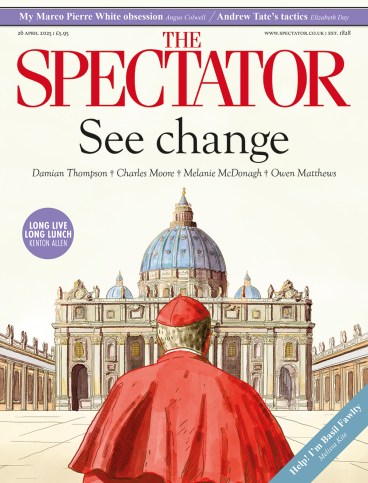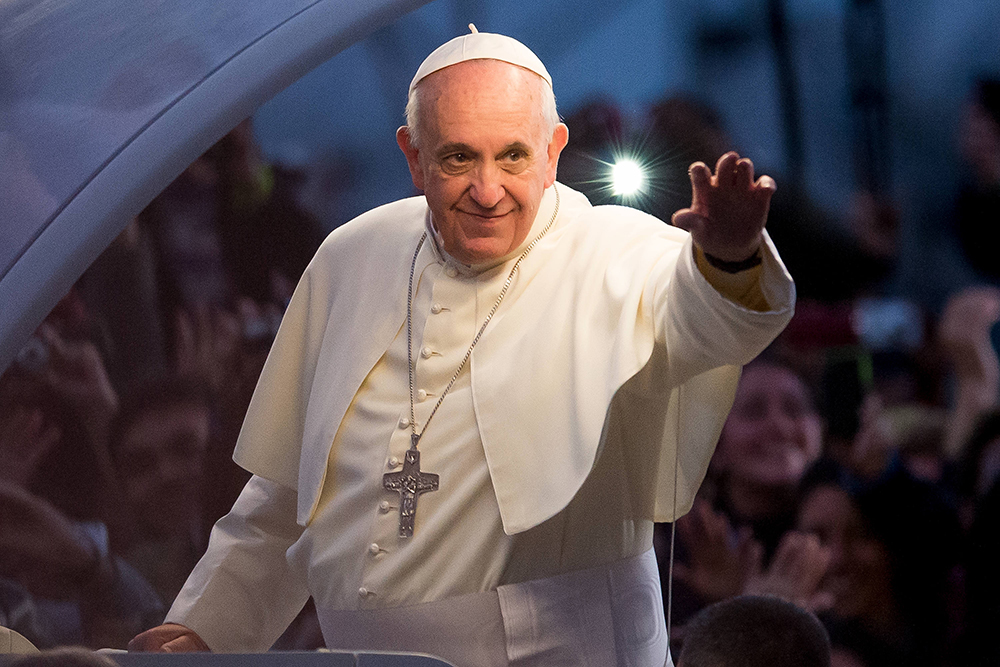
After Pope Francis emerged from the Gemelli hospital in Rome last month, a reflection attributed to him a few years ago returned to circulation. It was on ‘hospital’. Some of it was the usual, about how it’s where like meets unlike (‘In intensive care you see a Jew taking care of a racist’ etc). Some seems like standard homely Francis: ‘This life will pass quickly, so do not waste it fighting with people… Do not worry too much about keeping the house spotless.’ And it ended: ‘Love more, forgive more, embrace more… And leave the rest in the hands of the Creator.’
That was the disconcerting thing about Francis. Everything eventually boiled down to the love of God. It’s why even sound criticism of him somehow misses the mark. Because although he was wrong in lots of ways (his brusque treatment of traditionalist Catholics), inept in others (his dealings with the CCP), often unpopish (he could be potty-mouthed in public), and plain annoying in the way he dismissed the trappings of the role, which were never meant to be about him anyway, he kept turning back to the heart of the thing: Jesus Christ.
It showed in the way he gravitated to the unassuming, to children, to migrants, to poor people. I’m sure he was happy to see the King and J.D. Vance last week, but he was perhaps more moved when he visited the Regina Coeli prison in Rome, where the inmates grasped his hand and kneeled. I saw him in the United Arab Emirates, where the Sheikh led him by the hand into the great stadium and he made a historic address (it was, said one scholar of Islam, pitch-perfect). He issued a joint statement with the Grand Imam of Cairo about the common pursuit of peace, and he was serious, buttoned-up. When he met the ordinary workers, though, he was relaxed and smiling. That’s how it should be.
I saw him too during a humiliating trip to Ireland – the Taoiseach ran rings round him in an address on diverse family types, and people stayed away in droves from the great mass in Phoenix Park – but with individuals he lit up, especially at a homeless centre run by Capuchin friars. He had his priorities right.
There were lots of things I found infuriating about Francis – it’s all very well to talk about hospitality to the stranger, I would mutter when he went on about migrants, but it’s not much help if you’ve got millions pitching up unasked in Europe – but his focus on the poor and the vulnerable, on the individual rather than the group, is what Christianity is about.
Those priorities pre-dated his papacy. John Allen, a veteran Vatican observer, visited the slums of Buenos Aires after his election. He asked the priest there about Pope Francis being the bishop of the poor: was it spin? He replied: ‘Look, why don’t you just go out in the street and ask the people?’
‘On that dare, I went out on the street,’ Allen said, ‘and I polled about five or six people and asked, “What do you know about Bergoglio?” Before they said anything, they all went into these tin shacks they lived in that they called their homes and they came back out with these prized pictures with Bergoglio baptising their children, or confirming their nephew, or sitting in their living room when their husband died.’
He was sound on other stuff too. No one was more trenchant about surrogacy, for instance, which he regarded in his Latin American way as an affront to the dignity of women, or abortion or assisted dying. And he wasn’t afraid to sound off about Europe’s demographic crisis. ‘We must not accept that our society gives up on generating life and degenerates into sadness. When there is no generation of life, sadness steps in, which is an ugly and grey sickness,’ he said, with Giorgia Meloni, the Italian PM, looking on.
He was not as brilliant as his predecessor, but he was well grounded. His encyclical last year, Dilexit Nos (‘He loved us’), about the human and divine love of God, began with Homer as well as scripture. It’s worth reading: ‘We find ourselves immersed in societies of serial consumers who live from day to day, dominated by the hectic pace and bombarded by technology, lacking the patience needed to engage in the processes that an interior life by its very nature requires.’
Pope Francis was, for all his faults, a lover of God. Requiescat in pace.
Catholic theologian Fr Alexander Lucie-Smith joins Damian Thompson on the latest Holy Smoke podcast to discuss what Pope Francis’s legacy might be:








Comments